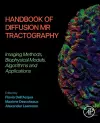
Handbook of Diffusion MR Tractography
3 contributors - Hardback
£117.00
Flavio Dell’Acqua (FDA), King’s College London, is Senior Lecturer in Translational Neuroimaging at the Department of Forensics and Neurodevelopmental Sciences and the Sackler Institute for Translational Neurodevelopment, Institute of Psychiatry, Psychology and Neuroscience. FDA's research focuses on the development and application of new diffusion imaging and tractography methods for neuroscience, psychiatric and clinical research as well as preclinical applications. FDA is coauthor of more than 60 papers and his methods have been successfully applied in a broad range of tractography studies ranging from the first visualisation of the superior longitudinal fasciculus in humans (Thiebaut De Schotten*, Dell'Acqua* et al., Nat. Neuroscience. 2011) to application on autism (Catani et al. Brain 2016), stroke (Forkel et al. Brain 2014) and neurosurgery (Vergani et al. Neurosurgery 2016). His methods have been fundamental also in major debates on new neuroanatomical theories (Catani, Body & Dell’Acqua, Science 2013) and, more recently, FDA contributed in the critical evaluation of the current challenges of modern tractography and structural connectivity methods (Maier-Hein et al. Nature Communications 2017). FDA is currently the lead of the diffusion imaging analysis team for the largest European multi-centre study on autism (EU-AIMS) and is collaborating with research institutes across Europe and US. He is a member and co-founder of the NATBRAINLAB (www.natbrainlab.com) an interdepartmental laboratory dedicated to the study of human neuroanatomy and tractography research. Since 2014, he has been the organiser of the educational courses on Diffusion Imaging for the Organisation for Human Brain Mapping (OHBM) conferences. He is also an active member of the International Society of Magnetic Resonance in Medicine (ISMRM) where he has lectured at the morning educational courses and past international workshops (Lisbon 2016 and Ljubljana 2017) on tractography methods. The investigator Maxime Descôteaux is a member of the Medical Imaging Axis of the Centre de recherche du CHUS, professor of the Computer Science Department, Faculty of Science, Université de Sherbrooke, Director of the Imaging and Visualization Platform (PAVI, pavi.dinf.usherbrooke.ca) and Director of the Sherbrooke Connectivity Imaging Laboratory (SCIL, scil.dinf.usherbrooke.ca). He is a leader in diffusion Magnetic Resonance Imaging (MRI) acquisition, processing and visualization to infer white matter connectivity of the brain. The goal of his research is to develop state-of-the-art fiber tractography tools to better understand functional coupling between cortical and sub-cortical regions of the brain and study connectivity properties of white matter to characterize fiber integrity. This field is now named ‘’connectomics’’. His most important contributions are in the fields of fundamental diffusion MRI processing and white matter fiber tract reconstruction and visualization. Recently, his tools have made the transfer to clinical applications for neurosurgical planning and interventions. He is a member of the editorial board of several important journals in neuroscience and co-founder of the company Imeka Solution Inc (www.imeka.ca). Alexander Leemans is a physicist who received his Ph.D. in 2006 at the University of Antwerp, Belgium. From 2007 to 2009, he worked as a postdoctoral researcher at the Cardiff University Brain Research Imaging Center (CUBRIC), Cardiff University, Wales, United Kingdom. In 2009, he joined the Image Sciences Institute (ISI), University Medical Center Utrecht, the Netherlands, where he currently holds a tenured faculty position as Associate Professor. His current research interests include modeling, processing, visualizing and analyzing diffusion MRI data for investigating microstructural and architectural tissue organization. He heads the PROVIDI Lab and is the developer of ExploreDTI, which is a graphical toolbox for investigating diffusion MRI data